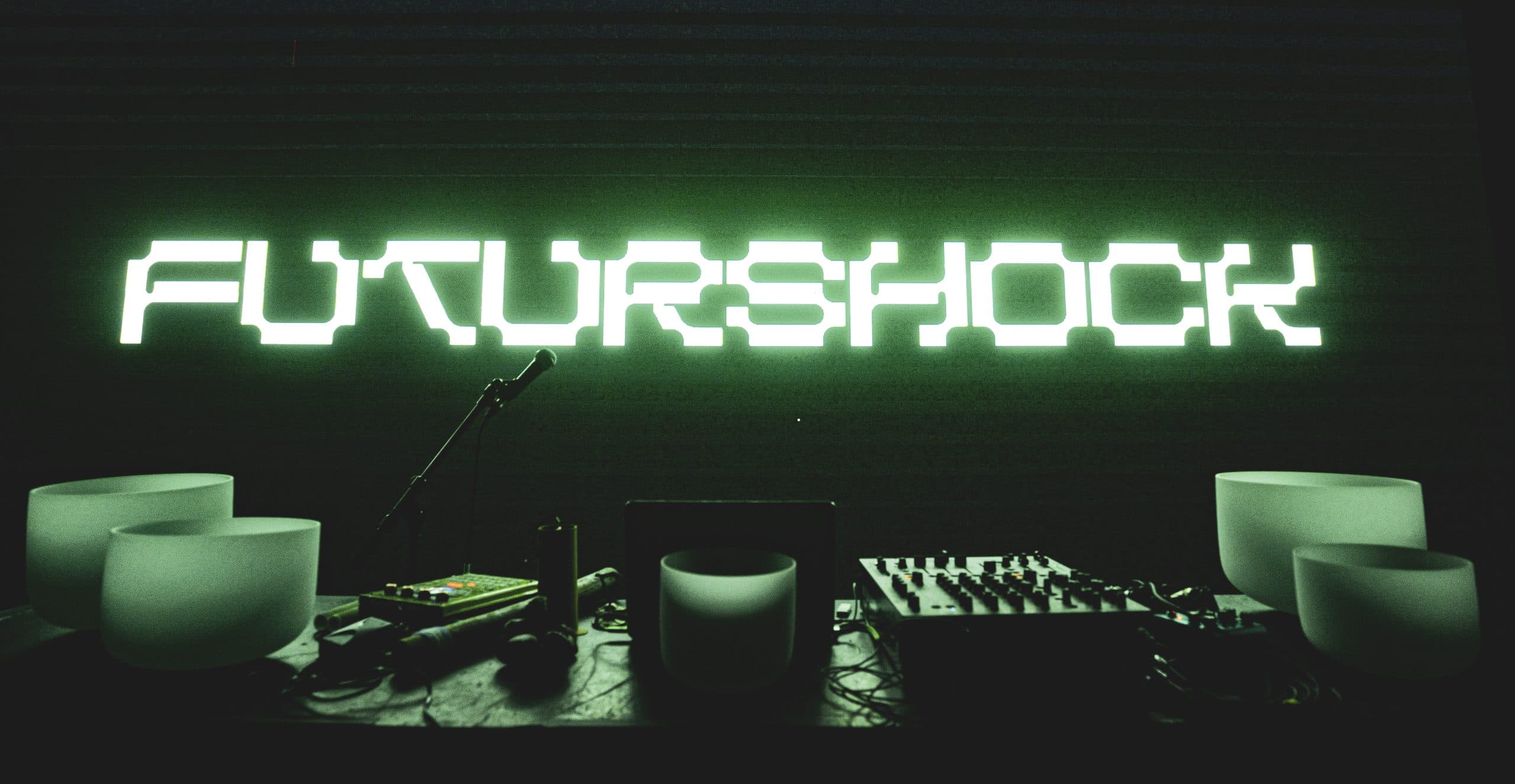
FEATURE: Futur.Shock (Interview with Karolina)
Threads are proud to present the following interview between Alec Jetha and Karolina Magnusson Murray, FOLD’s Head of Art and founder of Futur.Shock—an event series quietly drawing a cult-like following in London for bringing cutting-edge contemporary art to the club, in order to think outside of it.
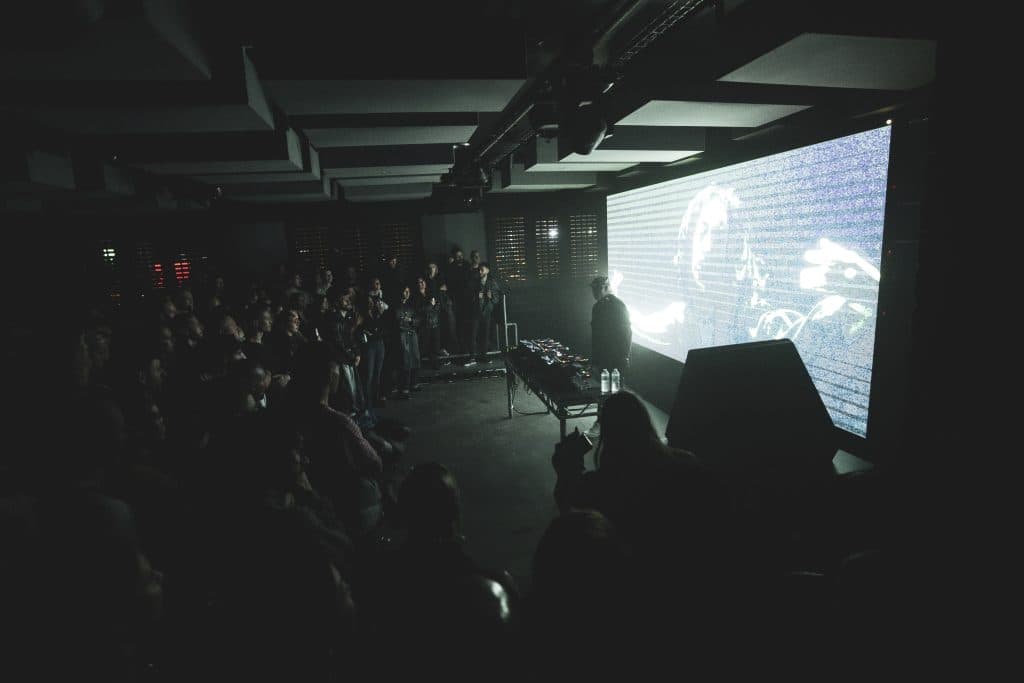
by Alec Jetha
Intro: Nuru Khaliel & Alex Honey
Previously known as Fold Lab, for the past year or so Futur.Shock has been establishing itself as a hotbed for contemporary visual art, sound, sculpture and performance, curated around a series of keywords (recently Bellicose, Scraper, Purge, Lusus Naturae). Common themes include (post)modernity or the “shock of the new”, belonging and identity, queerness and futurity.
Since lockdown, following a botched Arts Council funding application, Magnusson Murray (referred to by many simply as “Karolina”) decided to take matters into her own hands, soon renaming the event after the increasingly relevant 1970 classic by Albert Toffler. By showcasing the latest in performance and design whilst giving a platform to smaller DJs, what sets Futur.Shock apart is its ability to think outside of the “white box” of many art spaces, thus living up to the labels of being both contemporary and experimental. Its atmosphere is inherently anarchistic in both form and content, featuring the work of both commercial and non-commercial artists next to one another: you may never know whether to expect a meditative film, ambient bass set or some primal screaming—potentially all at once.
One can find a kaleidoscopic range of mediums at any event, but in particular Chapter 3: Purge and Chapter 4: Scraper stood out to us as highlighting the diverse and inclusive nature of the project—not just sociopolitically but in terms of artistic medium—as here people experienced the full range of audio, visuals, performance, and sculpture combined together. The entire surroundings is built to be immersive, transforming the club environment into something else entirely. Some of our favourite performances so far include those by Zlaya (v), jrah and Rieko Whitfield—with the 23rd of February having a special focus on contemporary dance (you can find a link at the bottom of the article).
Hosting an international array of artists and DJs, known and unknown, and having collaborated on events with everyone from the London Short Film Festival to Guttering, Alec Jetha caught up with Karolina in her FOLD studio ahead of tomorrow’s event to find out just what makes her tick.
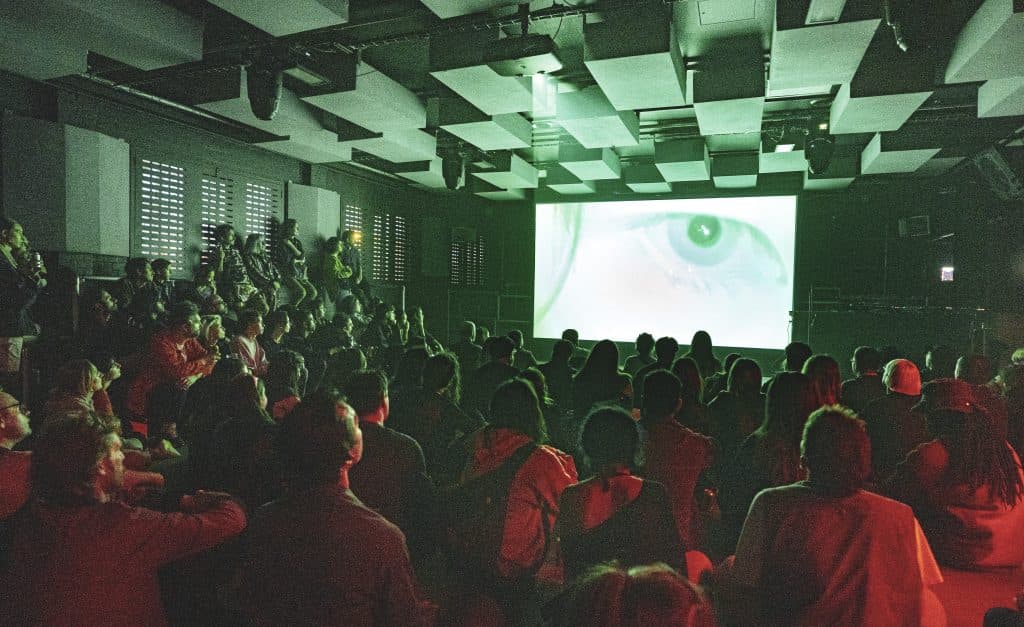
Alec: So my first question is, you changed your name to Futur.Shock. Was that inspired by the Alvin Toffler book?
Karolina: Yeah. So, basically, that was back in the end of 2018, beginning of 2019, we got the funding, and that was when we called it Fold Lab. We weren’t really sure what it was yet so it was just like a quick name. None of us liked that name anyway.
Alec: When you say all of us, you mean, everyone involved with fold?
Karolina: Yeah. And to be fair, it was like the very beginning of the idea. IIt took quite a while to figure out what it is, but we knew that we wanted to do it. It was during lockdown when I read the book (Future Shock) by Alvin Toffler, there was a artist that performed (at Fold Lab) called Alexis Milne, who was reading the book at the time and got me on to it. That’s when I started to conceptualise the whole idea around what the platform is—during lockdown it felt poignant when I was reading it. I was thinking at that time, we had been thrust into the unknown, and into a future that we weren’t prepared for or even knew. Everybody was trying to understand what we had been thrown into. So that’s kind of what made me think about the idea of how it’s so relevant to this era now. This was September 2020 when we registered Futur.Shock as a CIC, not-for-profit. That’s when we started to rebrand. That’s when I, conceptualised the idea behind it—and what we wanted to do was submit an Arts Council application to do a big exhibition down here, you know, where these studios are now, just like a big empty space. But we didn’t get the funding for that.
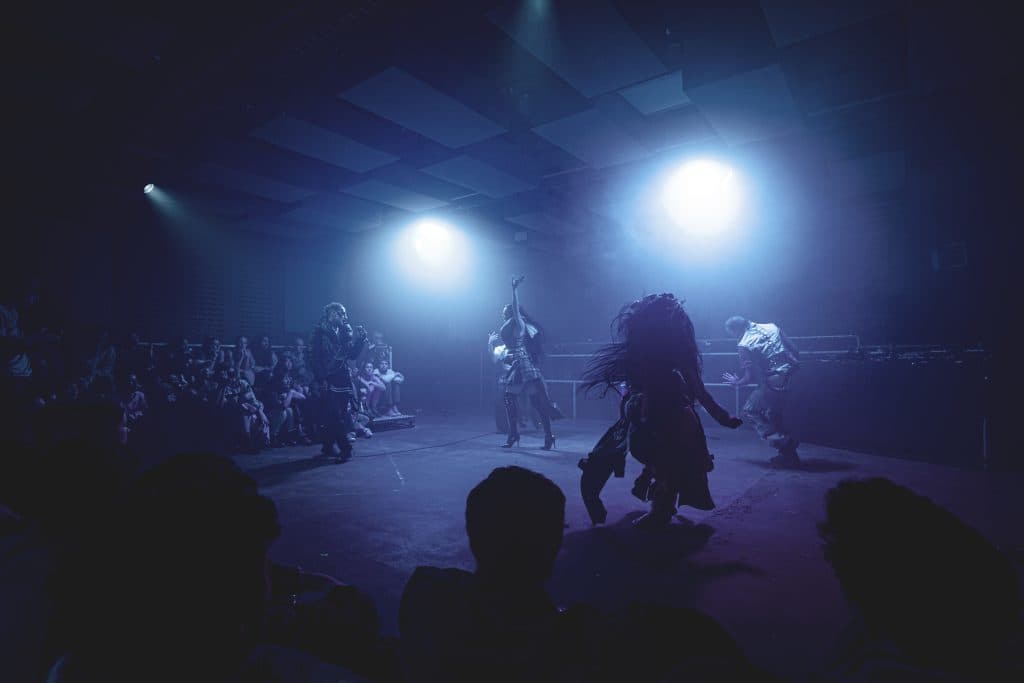
Alec: So it’s almost like the change of the name was the signifier for you wanting to actually push Futur.Shock in the direction that you wanted it to go in. In a conceptual sense.
Karolina: Yeah. And what I wanted to do is pick, artists from multiple different genres and they would respond to the idea of Futur.Shock and try to understand where they are in terms of their own practice, personal lives, metaphysical and psychological lives. I wanted each invited artist to respond to that theme, but we didn’t get to do that and I was quite upset about that at the time. But, I have actually taken all of those ideas and channeled them into the Futur.Shock LIVE series and the themes for each event. The great thing about it is that we’ve now figured out how we don’t need to rely on funding to make it happen. There’s not a massive budget for it because it only works related to ticket sales for now… But we have the proof of concept and the audience and we can grow from there.
Alec: It’s interesting because you’re talking about this idea of not knowing, within Toffler’s work, not knowing the future and being able to predict it. Do you think that the whole unpredictability of running something like Futur.Shock is related to that?
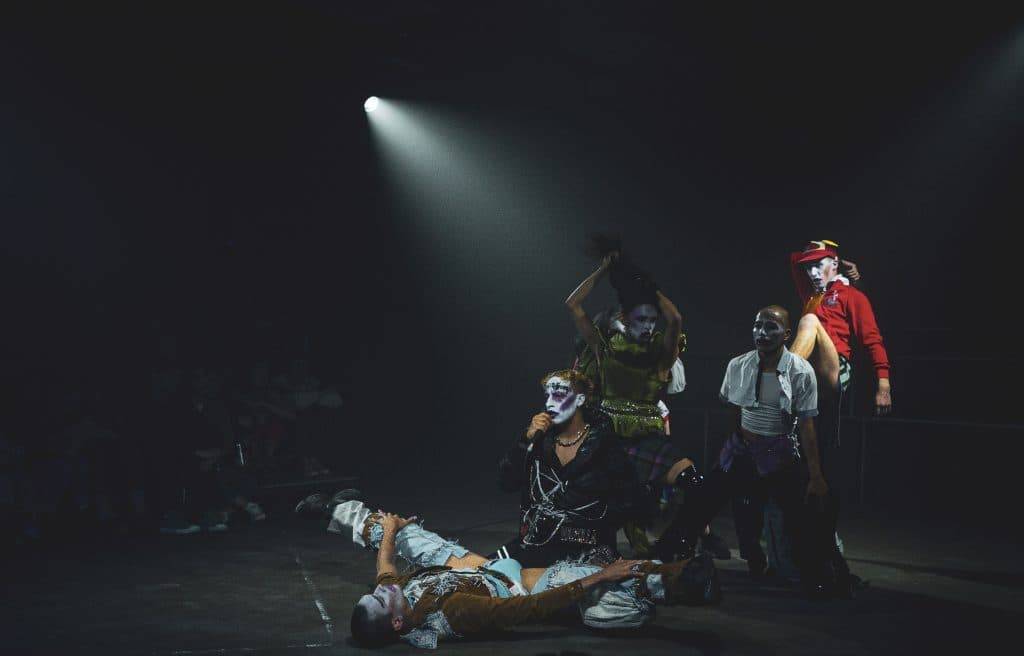
Karolina: Yeah, definitely. I think it’s like the unknown, not knowing whether something like this is gonna work. And actually, each artist has had a sensibility for, what that means, and then has responded to that. So yeah, it definitely has some kind of correlation.
Alec: Yeah. It’s also really interesting, because, you know, Toffler was, I think, what Derrick May and Atkins read when conceptualising Techno. It’s really interesting, because, Futurism was very much, something that was profound back then. So do you find that you’re still sort of engaging with that and that it’s still relevant today?
Karolina: Well, yeah, because it’s true. The fact that during the lockdown, or during this period, where there’s so much happening politically and culturally, we’ve had this weird standstill. We’re trying to, in a sense, recalibrate, as a community, so it feels really relevant, even though this book was written in the 70s. Yeah, that kind of concept is so relevant in figuring out where we are politically, socially, mentally and culturally
Alec: Yeah, it’s interesting, almost how something like, let’s say, COVID can happen, and it can almost be like a repetition of those same uncertainties.
Karolina: Yeah. I think the thing we wanted just before we started, was the hunger for something different. The way that people were making work, maybe during lockdown, is a more calmer and introspective process of making. Rather than before, where I noticed that within our community the musicians, producers and all artists, even what I made during lockdown is different. You’re not just thinking in terms of just club culture. It’s like not making bangers for everybody just to consume while they’re in a club environment. It’s people wanting to make something that’s just for themselves, or for their peers. Or to make sense of the situation that we’re in, you know, like quite dark motifs.
Alec: Well, it’s very interesting you say that because it seems like COVID has greatly affected your conceptualization of this. I’ve read an interview where you were talking about the relationship between digital art, the digital world and promoting art. The sort of breaking down the barriers for people that are struggling to put their artwork out there. So do you think COVID has had an impact on the importance of that for you?
Karolina: Yeah, the things that are interesting for me is the relationship between how the audience and the artist, can create work together. I mean, this isn’t necessarily digital, but I feel for me, in this space (referring to Fold), the fact that there is one room, there’s no stage, there’s no other space that you can go, you’re on the same level, to the audience. That is in a way, part of the process, part of the artwork. The performance happens with the audience, they’re just standing with them. Things that I keep thinking about so much is how, for instance, Unfld and Futur.Shock now seem to be growing as a community. You get regular people that have returned, that come to each one. The regulars, in a way, form the work.
Alec: So you’re as reliant on the audience, as you are on the artists?
Karolina: Yeah! And how that’s community building. And the thing that interests me is the kind of political, implications of that, how you’re then not reliant on funding. And I suppose in relation to digital culture, that was the same thing with like NFTs and that kind of thing. Because you’re not relying on funding, and in being able to do that, the money goes immediately to the artists. Iin this way, by creating regular audiences, means that we don’t have to apply for outsourced funding, or rely on other people to be able to put on the event. We’re self-sufficient because if the community regularly comes, we have enough money to pay the artists. The people that come every single time, they’re just as important as the artist and the music.
Alec: Talking about the space, is that something that you’re really focused on with the actual production of the event—differing it from just say, a typical performance show or a club night, it’s the synthesis of both right?
Karolina: That was one of the main driving forces for wanting to do it in the first days, before it was Futur.Shock, or before any of the first Arts Council applications. It’s to me, like, my own personal work. My practice has always been based around institutional critique, getting away from white wall spaces and creating work that is basically informed by that thought process. I basically, feel like this space is anti-institutional. So many incredible artists that are part of this club space that people don’t understand, this space is artist-led, which is another draw. So it’s built by artists from scratch, you know, Lasha built this place, basically by hand, I mean, everybody did. So yeah, it’s kind of taking these artists from all different disciplines and bringing them into this kind of anti-institutional space, and seeing that if you give this environment to artists, what work will they develop—because you have the freedom, this incredible sound system and just a whole room (as well as the context and what that brings), but I am specifically interested in art that is not about club culture, as I feel that is a tired theme and not what I am aiming to curate.
Alec: Yeah, so for you it seems very much about this space and about how that’s kind of almost, separate from any sort of institutional influence.
Karolina: Yeah, it’s freedom. That’s what I also love about Unfold and Futur.Shock, you can get super talented but not well-known artists and still get an audience to come—which means you can give a platform to you know, up-and-coming and unknown artists that nobody knows about, and give them an audience and freedom.
Alec: Yeah, it’s not a focus on how much money you’re going to spend and how much return you’re gonna get from it, but a focus on what the space is going to offer to both the artists and the audience, right?
Karolina: Yeah, the culture and new kind of work that can be created through this environment and resources. I really think in a way, people can then create site-specific work. You know, I even went to see one of the artists Rieko Whitfield. I went to see her work at Jerwood Space and I found it really difficult to enjoy it. The sound was not good and it was really distracting.
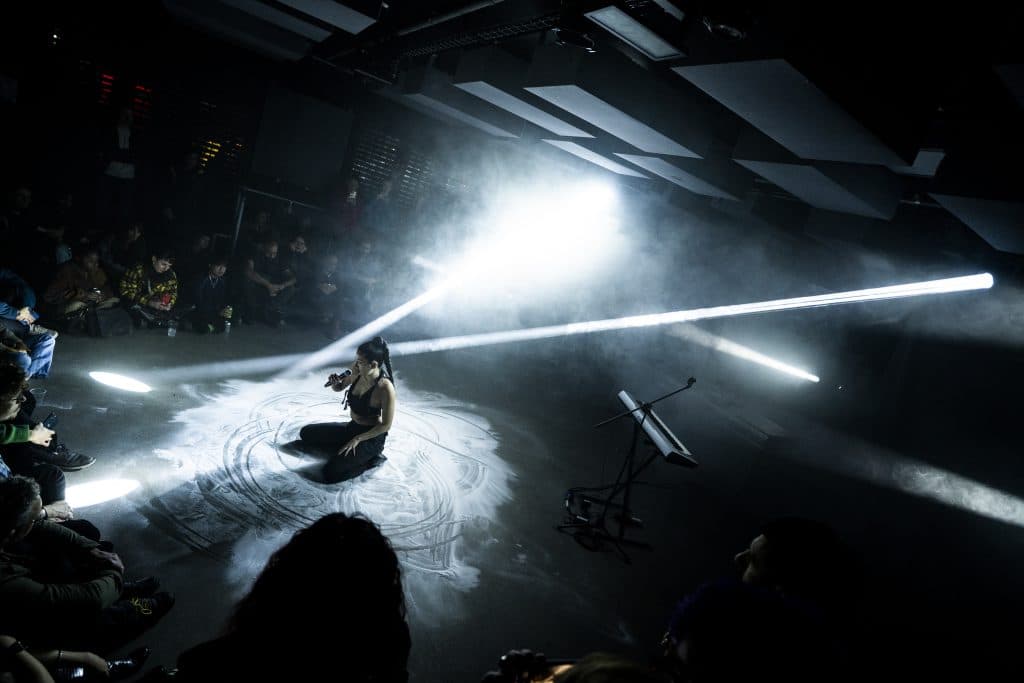
Rieko Whitfield performing at Futur.Shock Chapter 3: Purge
Alec: I guess there’s probably a bit of disconnect for, let’s say live performance, right? Because club spaces are usually reserved for DJs, or people doing perhaps more audio-led live performances. And then when you’re looking at spaces where you’re gonna get more performance art, a lot of those are very inaccessible. Specifically at the top range places like the Barbican etc. They’re not, you know, accessible for a lot of up-and-coming artists, they’re not gonna be able to, work with that level of production.
Karolina: Exactly. And that’s what’s amazing about this. For the next one, some of them are really not, well established at all. Then somebody like Sote is one of my favourite artists. To be able to put them all on the same kind of lineup is really exciting
Alec: The other thing I was gonna ask was about being a multi-disciplinary artist. Specifically, has that really influenced the way you’re able to do an event and make it something which is experimenting with different forms of artistic performance?
Karolina: Definitely, yeah. Because of the wide range of things that I’m interested in. For instance, in this next one, each performance is so different. And I also want to try something different with the staging. So instead of having you pointed at the screen (we’re not having visuals with this one), I’m going to utilise the whole space. And then the audience, hopefully, will just be all around the edge. I think on that level a result of how I think about my own work and what I want it to be. My own practice kind of seeps into each thing. But this one is the last one that I’m going to curate on my own for a while. I’m inviting other curators and organisations that really interest me, and that work within the concept of Futur.Shock and in the space.
Alec: So you’re getting people in to help curate without compromising your vision and ethos with the event?
Karolina: Yeah, because I pick those people and I feel like they fit within the idea of what I want and what Futur.Shock is. Especially in the upcoming one with Most Dismal Swamp who, I’ve been a fan of for a long time. He is curating a really interesting lineup that totally fits the ethos of Futur.Shock.
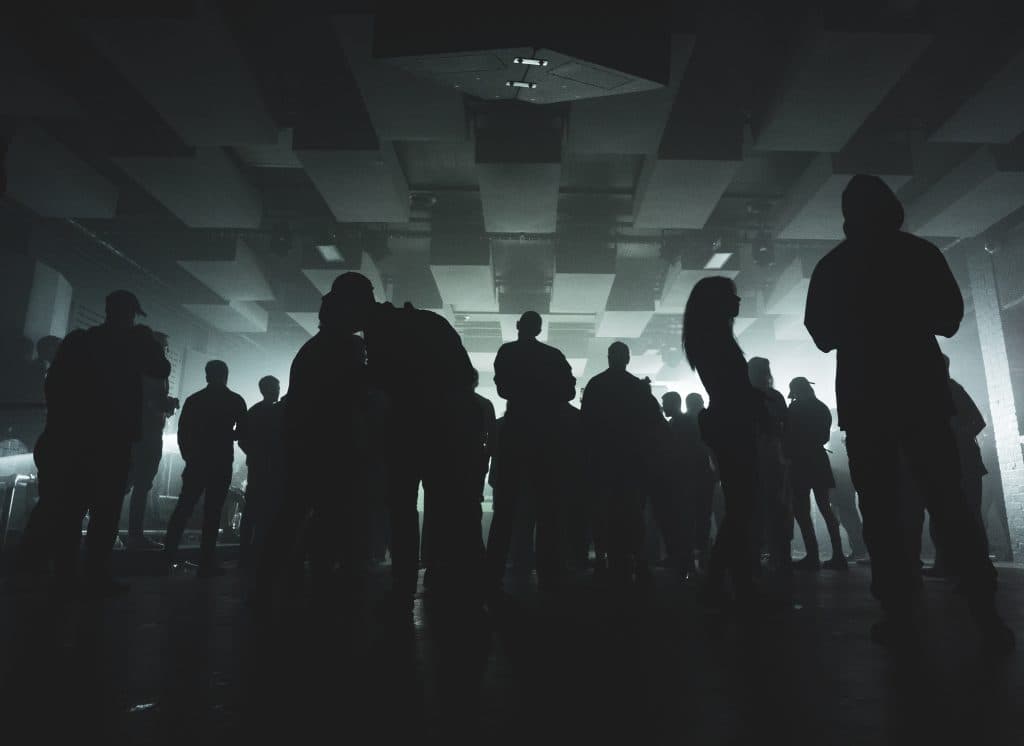
Alec: One thing I also wanted to ask, there’s obviously a conceptual theme for each event, what’s the process of coming up with a concept? And are you thinking to yourself “how am I going to portray that concept in this live performance space”?
Karolina: Well, for instance, this next one is quite important to me, the theme of purge, because I feel like it relates to when I was conceptualising Futur.Shock as a platform. It’s this idea or thought process of where we’re in a situation, where we’re not sure where we are. It’s also kind of how you purge within a ritual, for instance throwing up within an Ayahuasca ceremony. It’s like psychologically getting rid of this baggage, getting rid of old things to create space for new things. So for me, I think this next one, these different artists relate in their own way. For instance, with Sote. When we were discussing his involvement, he first had this other idea that he was gonna perform hardcore sounds from Iran. He felt like that didn’t actually make sense because of the political situation. So he wanted to do something more emotional, related to his state of mind and how he feels about what’s going on politically atm. Which I feel is a type of personal and political purging.
Alec: So he wanted to lead with more emotional motifs?
Karolina: Yeah. To me, that kind of makes so much sense. Even though I’m not sure if people will pick up on that, to me, conceptually, it’s political purging. With Adam Christianson, he sings in a kind of raw, emotional and very personal way. It’s his own very personal and emotional way of performing, so it just makes sense.
Alec: Like his performances are therapeutic in a way for him?
Karolina: Yeah.
Alec: Nice. So this theme of purging, I take it as very much being related to a reaction to COVID and everything else that’s going on right now. Purging is a sense of walking into a space and purging your emotional weight and emotional baggage within the event.
Karolina: Yeah, it’s personal-psychological purging, like shedding your baggage in a safe space. Rieko Whitfield, her work has that in a more kind of world-building, transcendental, ritualistic way. And the same for Jrah too… I think they’re all going to be quite visceral.
Alec: And well, I guess that kind of brings us quite nicely to the end. Is there anything else you want to sort of mention about the next event?
Karolina: Yeah just that this one is really personal to me and really linked to the whole conceptualisation of Futur.Shock in the first place. I’m trying something different with the way that they want the audience to be part of it. But then yeah, moving forward, collaboration is obviously really important to me, in terms of the space and the way that we are as a culture. I think it’s really important to collaborate and not have this individualistic way of seeing art or being an artist. So much can come out of collaborating that way and that’s kind of what I want to encourage. That’s why the next few months (moving into 2023) are going to be more collaborative, with guest curators that are really interesting to me.
[
View this post on Instagram
](https://www.instagram.com/p/CoFHRqfsNwg/?utm_source=ig_embed&utm_campaign=loading)
Editor: Alex Honey
Back to home.